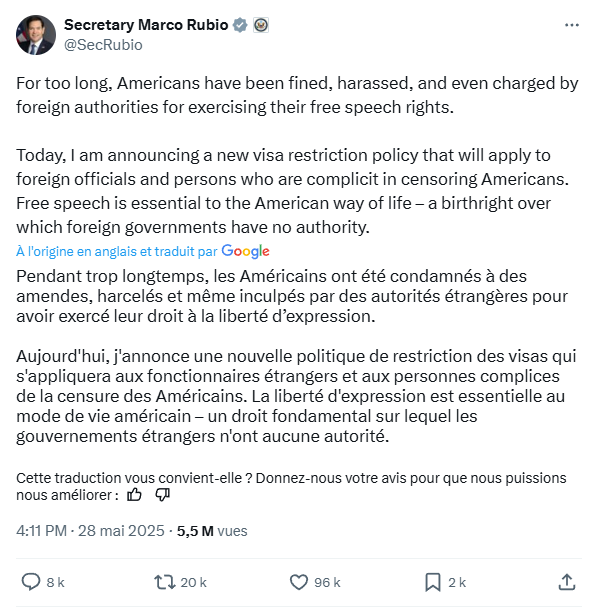Censoring The Censors
For more than ten years, the U.S. deep state has sought to leverage the European Union’s regulatory authority to undermine the First Amendment. The Trump Administration is not taking it any longer.
Secretary of State Marco Rubio unveiled yesterday a new sanctions policy targeting officials and individuals involved in the censorship of American citizens. Should the European Union’s Digital Services Act (DSA) remain, a significant number of European leaders and officials could face repercussions.
This sanction scheme is likely to spark amusement and cheers when figures like Thierry Breton are added to the list.
European and national officials complicit in censorship, alongside members of NGOs—referred to as “trusted third parties” under the DSA, to whom censorship efforts are set to be outsourced—are now under scrutiny. This also extends to judges who penalize American citizens or companies for exercising their constitutionally protected free speech.
The sanctions will impact a broad range of visas, including tourist, student, business, and E-2 visas, the latter enabling investors to reside in the United States for renewable two-year periods. This development is already causing significant anxiety across European power centers.
Since 2015, the U.S. establishment has sought to exploit European regulatory frameworks to circumvent the free speech protections guaranteed by the First Amendment of the U.S. Constitution. Donald Trump’s victory in the 2016 Republican primary, funded independently of donors, disrupted the establishment’s influence. His widespread public support triggered alarm within elite circles, prompting efforts to prevent his election—efforts that ultimately failed as he defeated Hillary Clinton.
The establishment faced a critical challenge: after leveraging social media to support Barack Obama’s election and the Arab Springs, it recognized that traditional methods of forming public opinion through advertising and legacy media were losing efficacy. The rise of digital platforms has decentralized the shaping of public opinion, enabling collective intelligence to challenge the establishment’s curated narratives.
The establishment views social media as a source of “informational disorder,” a perspective reflected in the creation of a dedicated commission by the Aspen Institute, a prominent globalist think tank. Its French branch was led by Jean-Pierre Jouyet, a key figure in French politics, having served as Emmanuel Macron’s mentor, a minister under Nicolas Sarkozy, and Secretary General of the Élysée under François Hollande.
The stated mission of the commission is “to identify and prioritize the most critical sources and causes of information disorder and deliver a set of short-term actions and longer-term goals to help government, the private sector, and civil society respond to this modern-day crisis of faith in key institutions”.
Rather than examining whether institutional distrust arises from serving narrow elites over the broader public or from a persistent disconnect between institutional narratives and reality, the prevailing assumption is simpler: the public is misguided. If people fail to understand or align with these narratives, it is attributed to misinformation or, worse, deliberate disinformation.





